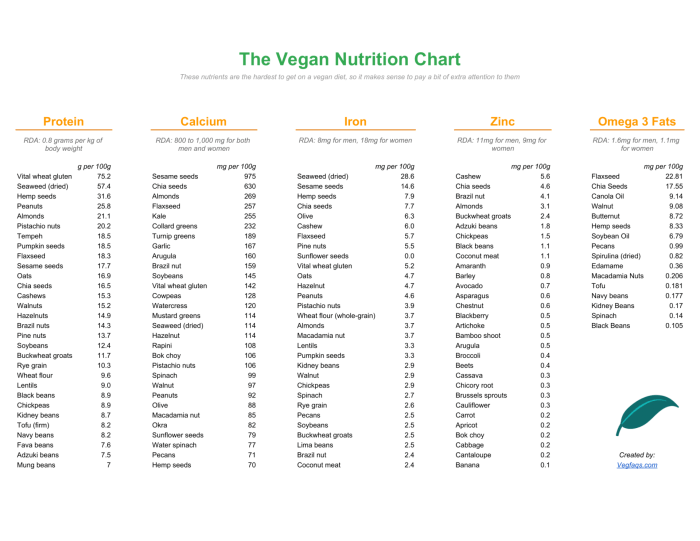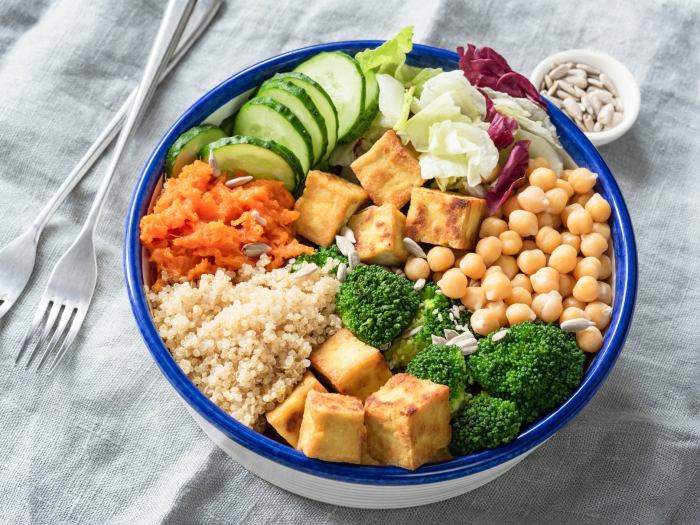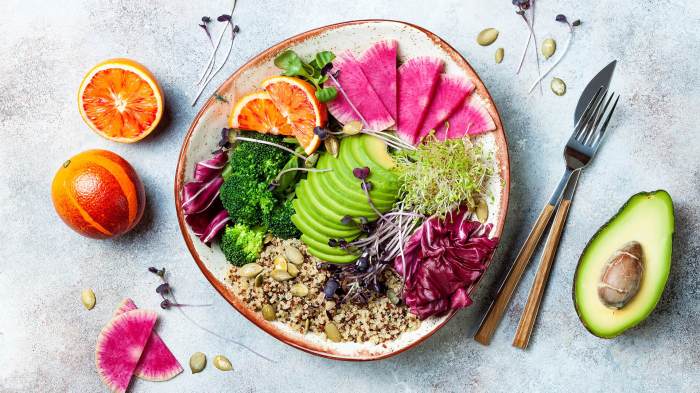Vegetarian diet information is a comprehensive resource for individuals seeking to adopt a plant-based lifestyle. This guide explores the health benefits, nutritional considerations, ethical implications, and environmental impact of vegetarianism, providing a holistic understanding of this dietary choice.
As vegetarianism gains popularity, understanding the nuances of this lifestyle is essential. This guide will equip you with the knowledge and tools to make informed decisions about adopting a vegetarian diet.
Health Benefits of Vegetarian Diets
Vegetarian diets have gained increasing popularity due to their potential health benefits. Studies have consistently shown that individuals who follow vegetarian diets have a reduced risk of developing various chronic diseases compared to non-vegetarians.
Cardiovascular Health, Vegetarian diet information
Vegetarian diets are associated with a lower risk of cardiovascular disease, including heart attacks and strokes. This is attributed to the high intake of fruits, vegetables, and whole grains, which are rich in antioxidants, fiber, and phytonutrients. These compounds help reduce inflammation, lower cholesterol levels, and improve blood pressure.
- A meta-analysis of 20 studies found that vegetarians had a 24% lower risk of heart disease compared to non-vegetarians.
- A study published in the “Journal of the American College of Cardiology” showed that vegans had significantly lower levels of LDL (bad) cholesterol and higher levels of HDL (good) cholesterol than meat-eaters.
Type 2 Diabetes
Vegetarian diets have also been linked to a lower risk of type 2 diabetes. The high fiber content in vegetarian foods helps regulate blood sugar levels and improve insulin sensitivity. Additionally, antioxidants and phytonutrients in fruits and vegetables may protect against oxidative stress, which is a major contributing factor to the development of type 2 diabetes.
When it comes to veganism, there are a plethora of vegan things to eat that are both delicious and nutritious. From hearty plant-based burgers to creamy vegan ice cream, the options are endless. Whether you’re a seasoned vegan or just starting your plant-based journey, exploring the world of vegan cuisine can be a rewarding experience.
- A study published in “Diabetes Care” found that vegetarians had a 34% lower risk of developing type 2 diabetes than non-vegetarians.
- A meta-analysis of 10 studies showed that vegan diets were associated with a 23% lower risk of type 2 diabetes compared to omnivorous diets.
Nutritional Considerations
Vegetarian diets require careful attention to ensure adequate intake of essential nutrients. Key nutrients of concern include protein, iron, calcium, and vitamin B12.
Protein is crucial for building and repairing tissues. Plant-based sources of protein include beans, lentils, tofu, tempeh, nuts, and seeds.
Iron
Iron is necessary for red blood cell production. Plant-based sources of iron include fortified cereals, leafy green vegetables, beans, and lentils. It’s important to note that iron from plant sources is less easily absorbed than iron from animal sources.
Calcium
Calcium is essential for strong bones and teeth. Plant-based sources of calcium include fortified plant milks, leafy green vegetables, and tofu. Calcium absorption is enhanced by vitamin D, which can be obtained from sunlight or fortified foods.
Vitamin B12
Vitamin B12 is essential for nerve function and red blood cell production. Vitamin B12 is not naturally found in plant foods, so vegetarians must obtain it from fortified foods or supplements.
Types of Vegetarian Diets: Vegetarian Diet Information
Vegetarian diets vary in the types of animal products they exclude. Here are the main types and their nutritional implications:
Lacto-Vegetarian Diet
Lacto-vegetarians exclude meat, poultry, fish, eggs, and all animal-derived foods except dairy products (milk, cheese, yogurt, etc.).
Nutritional Implications:Lacto-vegetarian diets provide adequate protein, calcium, and vitamin D. However, they may be lower in iron, zinc, and vitamin B12 compared to non-vegetarian diets.
Ovo-Vegetarian Diet
Ovo-vegetarians exclude meat, poultry, fish, and dairy products but consume eggs.
Nutritional Implications:Ovo-vegetarian diets are a good source of protein, iron, and vitamin B12. However, they may be lower in calcium and vitamin D compared to lacto-vegetarian diets.
Lacto-Ovo-Vegetarian Diet
Lacto-ovo-vegetarians exclude meat, poultry, and fish but consume both dairy products and eggs.
Nutritional Implications:Lacto-ovo-vegetarian diets provide a balanced range of nutrients, including protein, calcium, vitamin D, iron, and vitamin B12.
Vegan Diet
Vegans exclude all animal products, including meat, poultry, fish, eggs, dairy, and honey.
Nutritional Implications:Vegan diets can be nutritionally adequate, but they require careful planning to ensure sufficient intake of protein, iron, calcium, vitamin D, and vitamin B12. Vegans need to rely on plant-based sources of these nutrients or consider supplementation.
Sample Meal Plans

A well-planned vegetarian diet can provide all the nutrients the body needs. Here is a sample 7-day meal plan to get you started:
Day 1
* Breakfast: Oatmeal with berries and nuts
Lunch
If you’re looking for a healthier lifestyle, adopting a vegan diet can be a great choice. There are countless vegan things to eat that are not only nutritious but also delicious. From fresh fruits and vegetables to plant-based meat alternatives, the options are endless.
Whether you’re a seasoned vegan or just starting to explore plant-based eating, there’s something for everyone to enjoy.
Lentil soup with whole-wheat bread
Dinner
Vegetarian chili with brown rice
Day 2
* Breakfast: Tofu scramble with vegetables
Lunch
Salad with grilled tofu, quinoa, and vegetables
Dinner
Vegetarian tacos with corn tortillas and black beans
Day 3
* Breakfast: Whole-wheat toast with avocado and sprouts
Lunch
Veggie burger on a whole-wheat bun with lettuce, tomato, and onion
Dinner
Pasta with marinara sauce and vegetables
Day 4
* Breakfast: Smoothie made with fruits, vegetables, and yogurt
Lunch
Leftover vegetarian chili
Dinner
Vegetarian stir-fry with brown rice
Day 5
* Breakfast: Oatmeal with peanut butter and banana
Lunch
Salad with grilled tempeh, chickpeas, and vegetables
Dinner
Vegetarian pizza with whole-wheat crust and vegetables
Day 6
* Breakfast: Tofu scramble with vegetables
Lunch
Leftover vegetarian pizza
Dinner
Vegetarian tacos with corn tortillas and black beans
Day 7
* Breakfast: Whole-wheat toast with avocado and sprouts
Lunch
Salad with grilled tofu, quinoa, and vegetables
Dinner
Vegetarian chili with brown riceThese are just a few examples of vegetarian meals. There are many other delicious and nutritious options to choose from.
Sustainability and Environmental Impact

Vegetarian diets have a profound impact on the environment, offering significant benefits in terms of greenhouse gas reduction and water conservation.
The production of animal products, particularly meat, requires vast amounts of land, water, and energy. By choosing a plant-based diet, individuals can contribute to the reduction of these resources and minimize the environmental footprint associated with food consumption.
Greenhouse Gas Emissions
- Animal agriculture is a major contributor to greenhouse gas emissions, primarily due to methane and nitrous oxide emissions from livestock and their waste.
- Vegetarian diets can significantly reduce these emissions by eliminating or reducing the consumption of animal products.
- Studies have shown that a vegetarian diet can reduce greenhouse gas emissions by up to 50% compared to a meat-based diet.
Water Conservation
- Animal agriculture is also a major consumer of water, with large amounts of water required for irrigation, drinking, and cleaning.
- By choosing a vegetarian diet, individuals can conserve water and reduce the strain on water resources.
- For example, it takes approximately 1,800 gallons of water to produce one pound of beef, while only 25 gallons are required to produce one pound of lentils.
Ethical Considerations
Vegetarianism is not only a dietary choice but also an ethical stance that considers the treatment of animals in the food industry. Many vegetarians believe that animals deserve to live free from suffering and exploitation and that consuming animal products contributes to their mistreatment.
Factory Farming
Factory farming, a common practice in modern animal agriculture, involves raising large numbers of animals in confined and unsanitary conditions. Animals are often subjected to overcrowding, lack of proper nutrition, and painful procedures such as beak trimming and tail docking.
These practices raise serious ethical concerns about the welfare and suffering of animals.
Epilogue

In conclusion, vegetarian diet information provides a multifaceted perspective on the plant-based lifestyle. By embracing a vegetarian diet, individuals can reap numerous health benefits, support ethical animal treatment, and contribute to environmental sustainability. Whether you’re a seasoned vegetarian or considering making the switch, this guide will empower you to make informed choices and live a healthier, more compassionate, and sustainable life.
FAQ Resource
What are the main health benefits of a vegetarian diet?
Vegetarian diets are associated with a reduced risk of chronic diseases such as heart disease, stroke, type 2 diabetes, and some types of cancer.
How do vegetarians obtain essential nutrients like protein, iron, calcium, and vitamin B12?
Plant-based sources of protein include beans, lentils, tofu, tempeh, nuts, and seeds. Iron can be found in leafy green vegetables, beans, and fortified cereals. Calcium is available in fortified plant milks, leafy green vegetables, and tofu. Vitamin B12 is primarily found in animal products, so vegetarians should consider fortified foods or supplements.
What are the different types of vegetarian diets?
Lacto-vegetarians consume dairy products, ovo-vegetarians consume eggs, lacto-ovo-vegetarians consume both dairy and eggs, and vegans exclude all animal products.